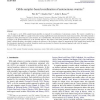Free Online Productivity Tools
i2Speak
i2Symbol
i2OCR
iTex2Img
iWeb2Print
iWeb2Shot
i2Type
iPdf2Split
iPdf2Merge
i2Bopomofo
i2Arabic
i2Style
i2Image
i2PDF
iLatex2Rtf
Sci2ools
AUTOMATICA
2006
2006
Gibbs sampler-based coordination of autonomous swarms
In this paper a novel, Gibbs sampler-based algorithm is proposed for coordination of autonomous swarms. The swarm is modeled as a Markov random field (MRF) on a graph with a time-varying neighborhood system determined by local interaction links. The Gibbs potential is designed to reflect global objectives and constraints. It is established that, with primarily local sensing/communications, the swarm configuration converges to the global minimizer(s) of the potential function. The impact of the Gibbs potential on the convergence speed is investigated. Finally a hybrid algorithm is developed to improve the efficiency of the stochastic scheme by integrating the Gibbs sampler-based method with the deterministic gradient-flow method. Simulation results are presented to illustrate the proposed approach and verify the analyses. 2006 Elsevier Ltd. All rights reserved.
AUTOMATICA 2006 | Gibbs Sampler-based Algorithm | Gibbs Sampler-based Method | Local Interaction Links |
| Added | 10 Dec 2010 |
| Updated | 10 Dec 2010 |
| Type | Journal |
| Year | 2006 |
| Where | AUTOMATICA |
| Authors | Wei Xi, Xiaobo Tan, John S. Baras |
Comments (0)

